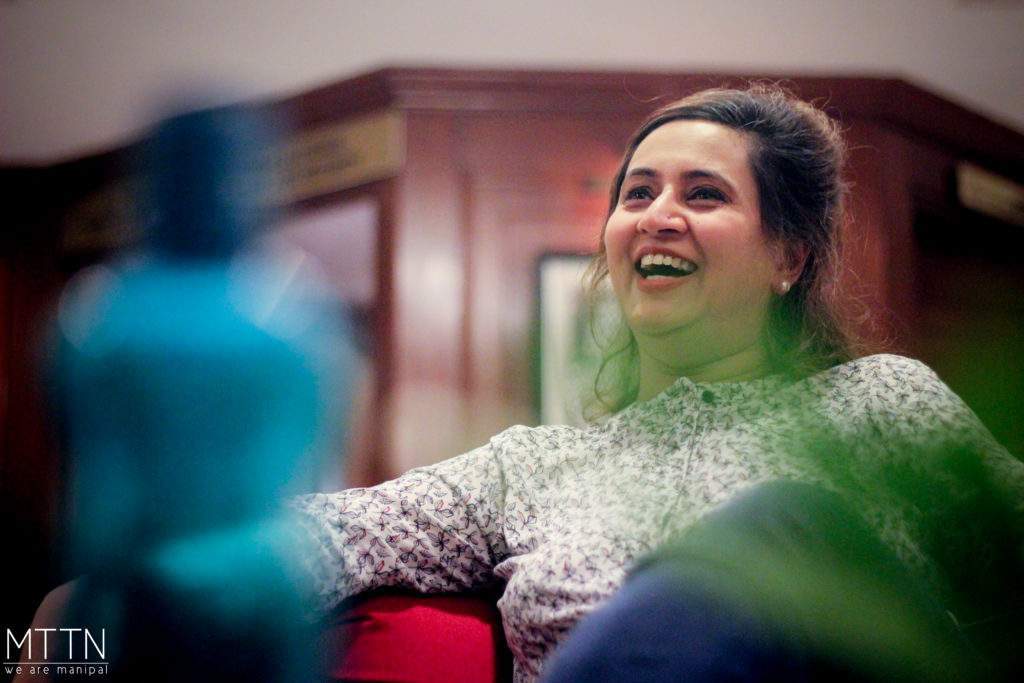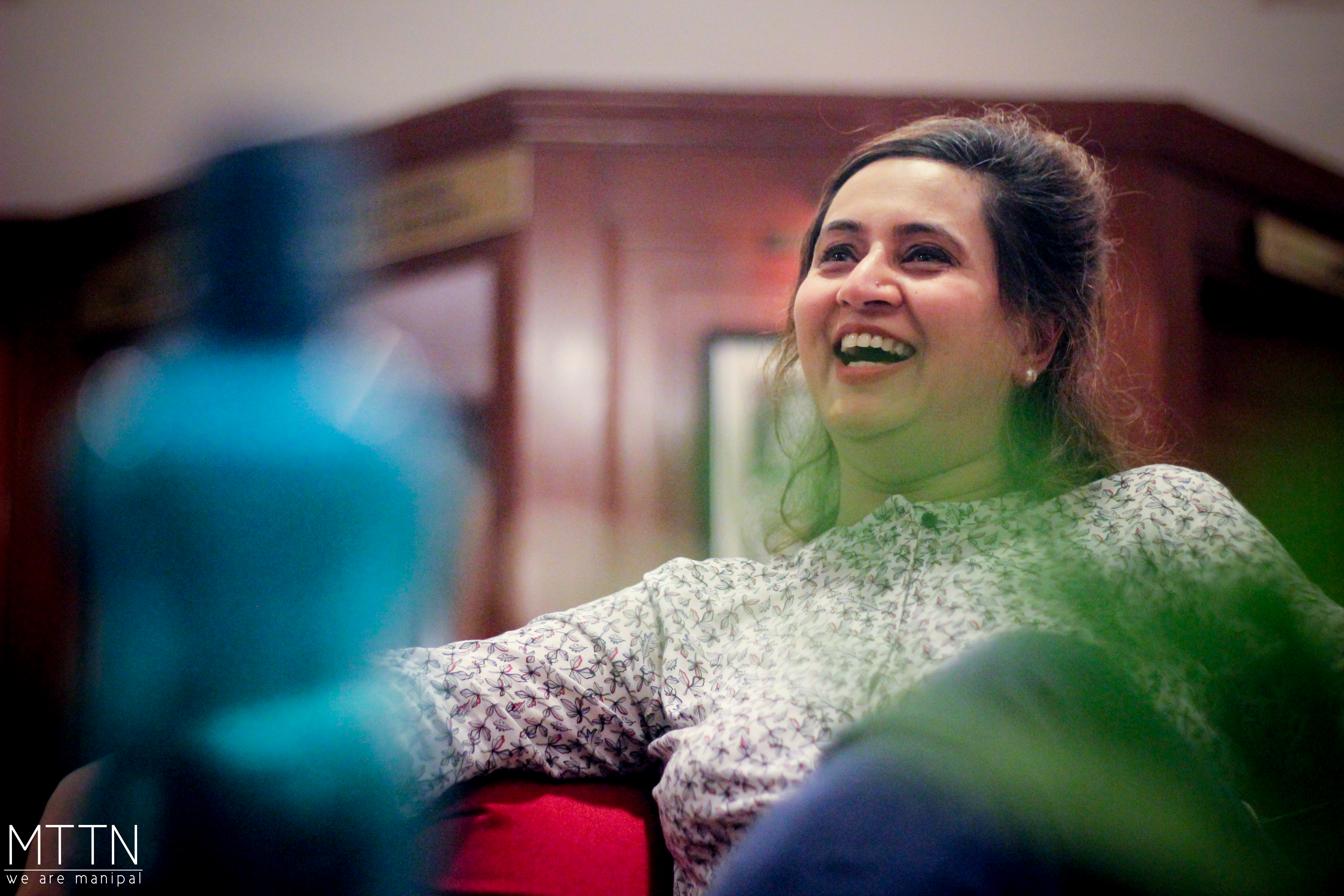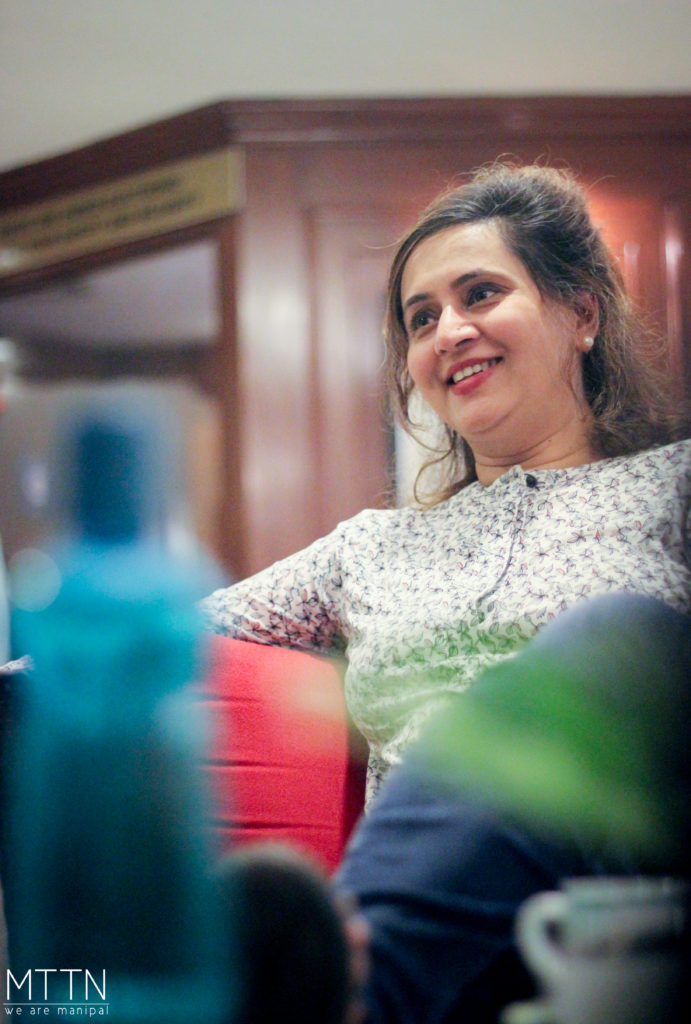
Journalist par excellence, Rhodes scholar and former prime time anchor on the news network CNN-IBN, Sagarika Ghose sat down in conversation with our MTTN Team, over tea in the lobby of Fortune Inn Valley View. Through the course of an hour-long interview, she talked to us about the shift of news media from television to the online platforms, expressed concerns over journalistic integrity and the widespread corruption present in today’s media. Here follows the transcript:
MTTN: Can you tell us a bit about your Rhodes journey?
Sagarika: I was fortunate enough to read a subject I really loved. I loved History. I had always taken an active interest in theatre. Stephens really helped me with that: The Shakespeare Society and The Hindi Society were all very important parts of my college life.
I remember in one of the interviews I was asked, “Why do we give the scholarship to you if you’re gonna run away to America and do nothing for the nation?”
I told them,” Don’t give it to me and you’ll be deprived of a great nation builder!”
That’s something they really liked about me. That sort of fighter cock spirit I had.
MTTN: Recently, there was a lathi charge in the BHU campus against women protesting for their liberties, for which you recently wrote an article on the Times of India. What do you think of the orthodox mentality prevalent amongst the authorities and even some of the students there?
Sagarika: Religious orthodoxies, of all hues, are in conflict with the modern woman. That is because these orthodoxies express themselves against the body of the woman: shaving, burkha, women have to cover up, menstruating women have to be confined to another room. The utterances of the VC were horrendous, to say the least. What does he mean by saying, “To keep a girl safe, she must be kept locked up in her room”? To prevent any sort of molestation or attack against women, the perverted mind of the men have to change. The way a woman dresses isn’t the problem.
The liberal modern woman is a threat to the patriarchal religious order.
MTTN: How do you analyze the liberal voices amidst these orthodoxies?
Sagarika: The Hindu society has thrown up great reformers through the course of time. India has seen reformers like Phalke, Rammohan Roy, Tagore, Derozio, many of whom were even upper caste Brahmins. Using religious ideologies to dictate one’s personal choices is not done. What I eat, what I wear, what I drink is my personal choice: that’s what my constitution guarantees me, religious ideologies can’t take that away from me.
MTTN: In this context, how do you see the rise of Modi?
Sagarika: I think Modi has tapped into this Hindu nationalism and Hindutva. That is especially important, with the rise of Islamic terrorism and militarism.
He plays well to the sentiments of the Hindu mard, so to say. His rise primarily resulted from the discredited secularism, that the Congress played. By the end of UPA 2, anyone who wasn’t the Congress would have won. There was too much of disenchantment.
MTTN: Do you think the media was responsible for this rise, especially tropes like Arnab?
Sagarika: I think he is a very unapologetic Hindu supremacist. Many journalists are that way. That really went in favor of Modi.
MTTN: Don’t you think having any ideology or supporting one particular party is very problematic from a journalistic standpoint?
Sagarika: It is very problematic. But the lines have become blurred. The media creates personality cults. For example, Indira Gandhi was India’s first supremo leader (aside:) a Bahubali of sorts. The people, as well as the media, like to worship personalities. Someone who can play to the camera can become dominant to the public eye. It’s important how the person reacts to the camera. This is why Rahul Gandhi is so bad it.
There should be some sort of regulation but these personalities make for great TRPs and that’s how it has become. There is a terrible corruption that has crept into the media. What is the public interest in seeing Kangana and Hrithik? That makes for a great TRP and that is why news channels keep on running those stories.
MTTN: How do you see journalistic integrity now?
Sagarika: Right now, the journalistic integrity and the credibility is very low. The news media, at present, is gone. It suffers from a crisis of conscience, commerce, and corruption. The television as an agenda-setting means is over.
We are moving onto a video, subscription-based platform.
MTTN: Don’t you think there is an added responsibility on the likes of you, Rajdeep and Barkha Dutt therein?
Sagarika: We are trying. At the end of the day, we are all salaried employees. We don’t have the capital required to set up our own channel. If you asked me, I would love to have an independent news platform. But the capital is just not there and neither is anyone interested in setting something of that sort. We are, however, looking at crowdsourcing. We are trying to do our own bit through our blogs, writing, and various social media.
There are websites, which are doing good work, like the Wire and Scroll.in.
MTTN: Where was the turning point in this breakdown of the television news media?
Sagarika: Frankly, it happened with the coming of Modi. The Congress was bad with giving media freedom and it constantly breathed down our necks. But this government is vindictive. They hold personal animosities against individual journalists. Since there are a lot of people who covered the Gujarat riots, PM Modi kept those grudges against those journalists.
MTTN: This brings us back to the point that if journalists like yourself don’t take a stand, who will?
Sagarika: We are. But we face so much flak. We receive death threats every day. Our safety is in question. Gauri Lankesh was shot and she was a very good friend of mine. She used to sit down like we are and talk to me like you are right now.
MTTN: Ma’am, you talked about subscription based platforms. How do you control fake news?
Sagarika: There are a lot of bodies, which exist to curb down fake news. There are websites like Alt News which are doing really good work.
MTTN: How do you face these threats and hate?
Sagarika: If you want to write, blog or be a journalist, you need to be brave. Why is the press important? The press is important because it’s there, where the people aren’t. You are doing it for the benefit of the people, as a service to the people. Some of us are high profile journalists, which is why we are protected. But there are journalists who are being killed. There are 32 journalists who are dead in the North East. Shantanu Bhowmick was lynched. Gauri Lankesh is shot.
If you’re criminalizing this democratic duty, people are scared to ask questions, which is important. The act of asking questions should be protected, not criminalized. The media acts as the fourth wing of a sovereign nation, aside from a Judiciary, the Legislature, and the Executive.
MTTN: On a lighter note, ma’am, how do you look back on Question Time with Didi?
Sagarika (laughs): That interaction, you know, affirmed my belief that politicians and journalists cant be friends. Mamta Banerjee and I used to share a cordial relationship for years before that interview, which is why once she came to power, she invited me for that interview. Afterwards, she came and told me, “You did this to me.” She saw it as a betrayal of her faith. What politicians don’t understand is that journalists are not loyalists. They are there to ask questions.
MTTN: What’s your highest point in your journalistic career?
Sagarika: Ever since I joined the media, it has been a great experience. Travelling around, presiding over various maramaari on Television, reporting on the ground have all been a great slice of life.
MTTN: Lastly, any messages for Manipal Students?
Sagarika: I have to say, ”Be brave.” Keep believing in yourselves and continue whatever it is that you’re passionate about. If you like to write, keep on writing, maintain your blogs and who knows you can be the next big journalist, doctor or engineer the nation will have!
-As said to Reetobaan Datta, Shraddha Murali and Srinath Balakrishnan
The interview has been edited for clarity.


Leave a Reply
You must be logged in to post a comment.